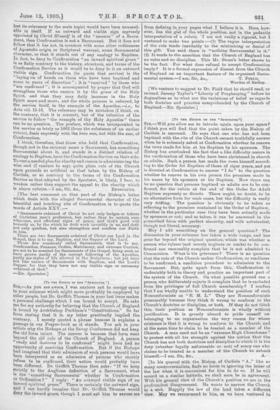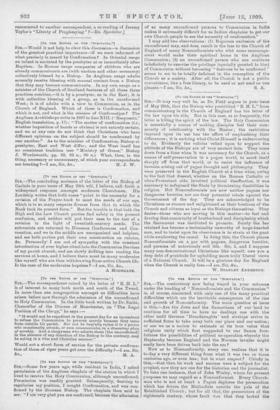[TO THE EDITOE OP THE " SplIOTATOP1.1 Sin,—Will you allow
me to intrude again upon your space ? I think you will find that the point taken by the Bishop of Carlisle is unsound. He says that one who has not been baptised with the rite of the Church cannot truthfully answer when he is solemnly asked at Confirmation whether he renews the vows made for him at his Baptism by his sponsors. The Bishop has overlooked the fact that a like difficulty occurs in the confirmation of those who have been christened in church as adults. Such a person has made the vows himself accord ing to the Order for Baptism of those of riper years, and yet is directed at Confirmation to answer "I do" to the question whether he renews in his own person the promises made in his name by his sponsors at his Baptism. Now there can be no question that persons baptised as adults are to be con- firmed, for the rubric at the end of the Order for Adult Baptism expressly so directs. There ought, no doubt, to be an alternative form for such cases, but the difficulty is really very trifling. The question is obviously to be taken as referring to the promisee contained in the Order of Baptism, whether in the particular case they have been actually made by sponsors or not; and so taken, it can be answered in the prescribed form with perfect sincerity, and with substantial, though not literal, accuracy.
May I add something on the general question ? The discussion in your columns has taken a wide range, and hiss gone far beyond the original question, which was whether a person who refuses (not merely neglects or omits) to be con- firmed can reasonably complain that he is not admitted to Communion. What is his grievance P There is no question that the rule of the Church makes Confirmation, or readiness to be confirmed, a condition precedent to admission to the Sacrament. But, quite apart from this, Confirmation is undeniably both in theory and practice an important part of the system of the Church. On what possible ground can a person who deliberately rejects it complain that he is excluded from the privileges of full Church membership ? I confese that I am wholly unable to understand the position of such Nonconformists as "E. M. L." They are Nonconformiets presumably because they think it wrong to conform to the Church's doctrine or discipline, or both. If they do not think this, their position as Nonconformists is wholly without justification. It is grossly absurd to pride oneself on belonging to an organisation the very reason for whose existence is that it is wrong to conform to the Churoh, and at the same time to claim to be treated as a member of the Church. A man need not be an "extreme High Churchman" to protest with all his strength against the notion that the Church has not both doctrines and discipline to which it is the duty (whether legally enforceable or not) of every one who claims to be treated as a member of the Church to submit
[In his quarrel with the Bishop of Carlisle "A.," like so many controversialists, finds no harm in ignoring the letter of the law when it is convenient for him to do so. If he will accord us a similar latitude, we shall soon be in agreement. With his general view of the Church's position we are in the
profoundest disagreement. He wants to narrow the Church eo a, sect. Happily the law of the land takes a different view. May WO recommend to him, as we have ventured to recommend to another correspondent, a re-reading of Jeremy Taylor's "Liberty of Prophesying" P—En. Spectator.]











































 Previous page
Previous page